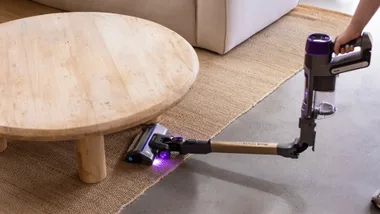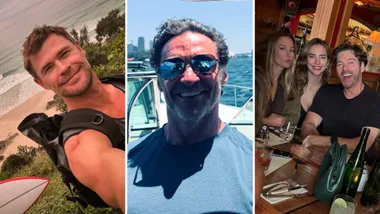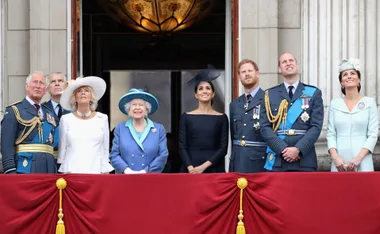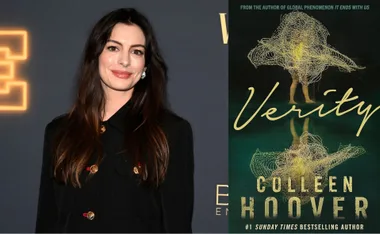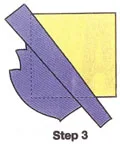Marika Cobbold’s Shooting Butterflies, published by Allen and Unwin, rrp $29.95, is this month’s Great Read. Look out for it in bookshops with our Great Read sticker on the cover.
Q: When did you know you want to be a writer?
A: Not until I was in my mid twenties. I grew up in a newspaper family but never thought of writing as an option while growing up. But I was a reader. In fact I did very little other than read. Books were more real than the real world. And I was a daydreamer, translating my experiences into stories in my head. Yet, it never occurred to me that I might write books myself. I am obviously rather slow. But once I sat down and began I knew it was what I was meant to do.
**Q: When did you marry?
A:** I met an English naval officer in my hometown of Gothenburg Sweden. I was still at school. I was very romantic, very impressed by the uniform and all that. We had only known each other for a couple of weeks, with a summer in between, when we got engaged. I was eighteen but at least I had finished school by then. We married six months later and I went to live in England. My parents liked my husband but they were pretty worried about how young I was. It wasn’t an act of rebellion or anything like that. I had a happy childhood, loved my parents, and always intended to go to university, have a career all that. Youth is rash and all that and few were rasher than I.
**Q: Are you still married?
A:** No, the marriage ended seven years ago.
**Q: Why?
A:** There were several reasons, there usually are. My ex-husband is a very nice man and I don’t regret marrying him in the slightest; apart from anything else we have two fantastic children, but I really was too young when we married. I was nowhere near ‘finished’, whereas my husband was much older and knew who he was and what he wanted in life and in a partner. Once the children were older and on their way, the differences between us became all too apparent. We were giving each other far more grief than joy. I read somewhere a description of someone’s marriage as “another middle-aged marriage without grace” and it certainly struck a chord with me. We’re good friends though and see each other on family occasions. I don’t think it matters how grown up your children are, they still like to see their parents being nice to each other and luckily, in our case, that’s not difficult.
**Q: What did you do after your marriage ended?
A:** I really didn’t know what to do at first. I had lived in countryside for almost twenty years; it’s much the best place to bring up children but suddenly I yearned for the city and with an eighteen year old and a fifteen year old, London seemed an exciting option. Practically the moment I arrived I felt as though I should have been here all my life. In fact when I go to the country to visit friends, I find myself longing for pavements under my feet. London was a new, exciting experience for me. I came here, too, in an incredibly privileged position. I am financially independent. I have two wonderful children, and a job I love and a great flat in a great part of town. For most people, being suddenly single is not so easy.
**Q: So that’s how you got your knowledge of English country life? I loved the scene in Shooting Butterflies, where you’re seated around the table with the blind guest and the bustling mother is so concerned with what she thinks is good for him she fails to see her family disintegrating in front of her.
A:** Yes, I must say I enjoyed writing that. I enjoyed living in the country, by and large but there are limitations, to put it mildly. It was my little shot at the past.
**Q: You have a new partner now?
A:** Oh, you want all the sordid details of my life, do you? No, I don’t have a partner anymore. We ended it after six years together. He is in publishing; that’s how we met. Again though, we’re good friends, so that’s OK.
**Q: Do you like living alone?
A:** I do. It’s rather wonderful being able to do what you want whenever you want. Eating croissants and chocolate for supper, chatting on the phone for hours, watching Sex and the City on TV, writing until three in the morning – and not having to explain or answer to anyone. I don’t really feel lonely. How can I? I have my children. There’s my son, the doctor, Jeremy, 26, and my daughter Harriet, who is 22 and an actress. They live around the corner from me, so I see them a lot. I have heaps of friends and other family. In time, I may feel as though there’s something missing in my life, most of us probably dream of settling down with that soul mate. And there are times when I look back to the time the children were small and wish I could have it all again, but that, as they say, is life.
**Q: Does writing come easily?
A:** I wish! It’s long and slow and solitary. I do a lot of sitting and staring into space. Someone once said that writing is easy; all you do is sit down at the typewriter and open a vein. I rather agree with that. It’s lovely having a book in your head. It’s not in the least lovely sitting down every day in front of a blank screen that seems to be screaming ‘Feed me! Yet in the few moments when the writing flows it’s like being in love. I think I’m someone who has to ‘translate’ life onto the page in order to live fully. (That’s probably a contradiction) So, on balance I wouldn’t swap my job for anyone else’s.
**Q: Where did the inspiration for Shooting Butterflies come from?
A:** I was out walking in the country one summer’s day when I came upon a large heap of horse manure on the path in front of me. I was about to step round, nose wrinkled, eyes averted but I paused instead, transfixed by the sight of a beautiful orange and gold butterfly its wings fluttering as it clung onto the heap of manure. That, I thought, just about sums up life.
I’ve been told by some people that Shooting Butterflies is a dark novel but I think it’s about hope. We often hear of how tragedy may lurk behind a glittering façade. Well, Grace, my main protagonist claims that sometimes a perfectly good life might be hiding behind a tragic façade. Grace is a photographer. She knows all about the difference an angle, a sliver of light, can make to the picture.
Bad things happen to Grace – bad things happen, that’s life. But in most aspects of her life, Grace has choices. Having choices is something that we might take for granted but for women of previous generations it was all too often an unachievable luxury as Grace realises through her developing friendship with ninety-year-old Louisa, batty ghost and forgotten wife of a great man.
To me, humour is the saving grace of mankind and Grace is funny. I know I wrote her, but she really is quite funny. Like many authors I am constantly frustrated by the gulf between that which I dream of writing and that which I actually manage, poor frail mortal that I am, to produce. But in Shooting Butterflies I think I have written rather a good novel. (I know that in English people don’t boast but I’m Swedish so I’m allowed.)
**Q: Your first language is Swedish. Why do you write in English?
A:** It’s pretty simple really. When I started writing I had already been living in the UK for some seven years. I spoke English to my husband and children and friends and it just seemed natural to continue communicating in that language.
**Q: Who are your favourite writers?
A:** I love Anne Tyler and Margaret Attwood, Carol Shield Jane Hamilton and Philip Roth. I very much enjoyed The Idea of Perfection by Kate Grenville. The list is endless, really, that’s the joy. There’s always a new writer to discover. I like the classics, of course: Hardy, Trollope, the Brontes. The Great Gatsby is incredible in its perfection. To Kill a Mockingbird is luminous. I think Jane Austen was the most naturally gifted writer ever. She wrote perfectly constructed novels and there weren’t too many creative writing courses around in the early nineteenth century. And P.G. Wodehouse still makes me laugh out loud.
**Q: Tell me about your childhood?
A:** It was good. Stable. A close extended family and lots of friends. Having a grandfather and father in the newspaper business was stimulating and my mother is very artistic so pictures and books and music were all about us, which makes for a pretty good start. There was much less emphasis on material things, not that many toys nor the constant round of activities that children are used to these days. I was left to do my own thing quite a lot. My mother actually believed it was good for children to be bored sometimes. I don’t think she’s wrong. It forces you to rely on your own resources – vital if you want to do anything at all creative. I have a Jewish grandmother and grew up with many Jewish friends and I think I got a Jewish sense of humour, i.e. pretty black, and also the very strong sense of family. There were and are a lot of very colourful personalities on both my mother and my father’s side, successful too. That’s a great thing to have with you – all these amazing, infuriating, ancestors. Although my children and I live in England we are all still very close as an extended family and we all spend the summers together on this Swedish island where I grew up.
**Q: The themes of wasted potential and fear of failure runs through your books, why do you think that is?
A:** I just think that being allowed to fulfill your potential should be a basic human right and it mostly isn’t. It certainly wasn’t for most women up until recently. And just think how many potential Picassos, Mozarts, Mother Theresas super models, educators, scientists … or simply good, productive people of whatever sex, there are, born every day who just don’t have a chance, through poverty and oppression. They never get a chance to achieve a fraction of what they could have been capable of, had they been born in for example Britain or Australia. Such a waste, such a tragedy. And such a privilege to be born in a time and a place where you have a chance and where you have a choice.
Of course, even in these days of increased equality, women have tougher choices than men. If you want to flourish in your career, family has to take a back-seat and if you want to give your family what it deserves it’s a pretty tall order to go as far as you might want in your career. As for failure … like most sentient beings I feel a failure myself a lot of the time so being self-centred, I give that trait to some of my characters.
**Q: You began writing very young with two small children. How did you fit it in with the demands of family life?
A:** You steal time. My husband was away for up to nine months at a go in the navy, and my family lived in another country so there wasn’t a lot of baby-sitting on offer, so spare time was scarce, but with writing, especially your first book, you can achieve a lot in quite a small amount of time as long as that time is spent consistently. The thing is to write something every day, even if it’s half a page at three o’clock in the morning. Of course if the writing takes off you get deadlines and sidelines and all that and then it’s the same story as for most women; you juggle and you work your butt off.
**Q: Your first novel was rejected. Why did you keep writing after the rejections?
A:** I just reckoned that I would be even more miserable not writing than writing so it was not really a choice. You just go on. It’s hard because you just don’t know if all the effort and sacrifice of time will ever amount to anything but a lot of pages in a desk-drawer. You start thinking of all the things you could have done with the past two or three years and multiply that with a lifetime. Think if nothing ever comes of it? And what a very uncomfortable thing it would be to maybe one day have to accept that one had all drive and the burning desire to create, all the foibles of a writer but that one lacked just that one little trait; TALENT. Spooky! Still, hope is the greatest gift, or con, so I carried on and in the end I got there.
**Q: You seem to have a great life?
A:** It is incredibly privileged. You are never really content though are you? I would definitely like to write better, sell more, get better reviews, win a few more prizes; all very un-British to be so ambitious, or at least to admit it, but there we are.
**Q: What next for you?
A:** That thing which is both a blessing and a curse in a writer’s life; the next book, always that next book when all I really want to do is sit back and watch Neighbours.
Newsletter conversion description. Get the latest in your inbox.



















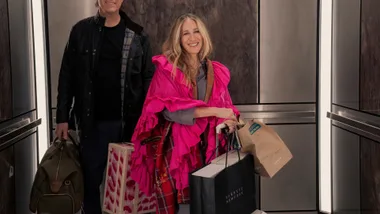

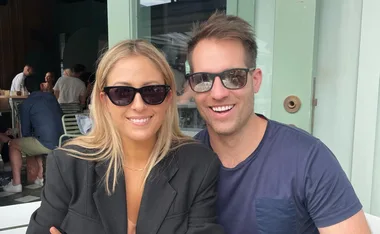
.png?resize=380%2C285)
